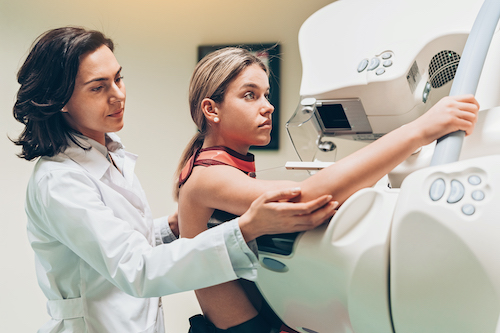
New Brunswick, N.J., September 21, 2021 –Federal guidelines along with state and local regulations led to a disruption in routine preventative cancer screenings, such as mammograms, in an effort to reduce the risk of the spread of COVID-19 in healthcare settings. According to the Centers for Disease Control and Prevention (CDC), new cancer diagnoses have declined significantly during the pandemic, which correlates to delays and cancellations in routine screenings. This may lead to cancers being diagnosed at a more advanced stage of the disease, which can present treatment challenges as well as adversely impact survival. It is more important now than ever to schedule your annual mammogram.
Mammogram Guidelines
Mammograms are the most effective screening tool for breast cancer, which uses low dose X-rays to create images of the breast. According to the American Cancer Society, it is recommended that women beginning at age 40 are provided with an opportunity to have a mammogram and women ages 45 to 54 at average risk for developing breast cancer should have a mammogram annually. Talk to your health care provider about what screening frequency and at what age to begin is appropriate for you.
COVID-19 Vaccination and Mammogram Concerns
One common short-term side effect of the COVID-19 vaccine is swollen lymph nodes under the arm in which the injection was given, which is a normal sign that your body is responding to the vaccine and building up defenses against the virus that causes COVID-19. Swollen lymph nodes under the arm might show up on a mammogram, which could cause concern and might lead to the need for further tests.
Mammograms can find breast cancer before there are any signs or symptoms, and before the cancer grows larger or spreads to other parts of the body. If you’ve scheduled a mammogram soon after receiving the COVID-19 vaccine, it’s important to tell your doctor when and in which arm you received the injection. Based on your situation, they can discuss with you if you should change your mammogram appointment.
Schedule a Mammogram
Cancer screening remains a critically important action we can take for finding cancers early and saving lives. It is important to continue seeking cancer care and it is safe to do so. Learn more at rwjbh.org/mammo.
Deborah L. Toppmeyer, MD, is chief Medical Officer and director of the Stacy Goldstein Breast Cancer Center and LIFE Center at Rutgers Cancer Institute; and Professor of Medicine at Rutgers Robert Wood Johnson Medical School. She also sees patients at Robert Wood Johnson University Hospital Hamilton, an RWJBarnabas Health facility.
###
For journalists – contact:
Krista Didzbalis
Media Relations Assistant
732-507-8307
krista.didzbalis@rutgers.edu
For patient appointments/inquiries – contact:
844-CANCERNJ (844-226-2376)

